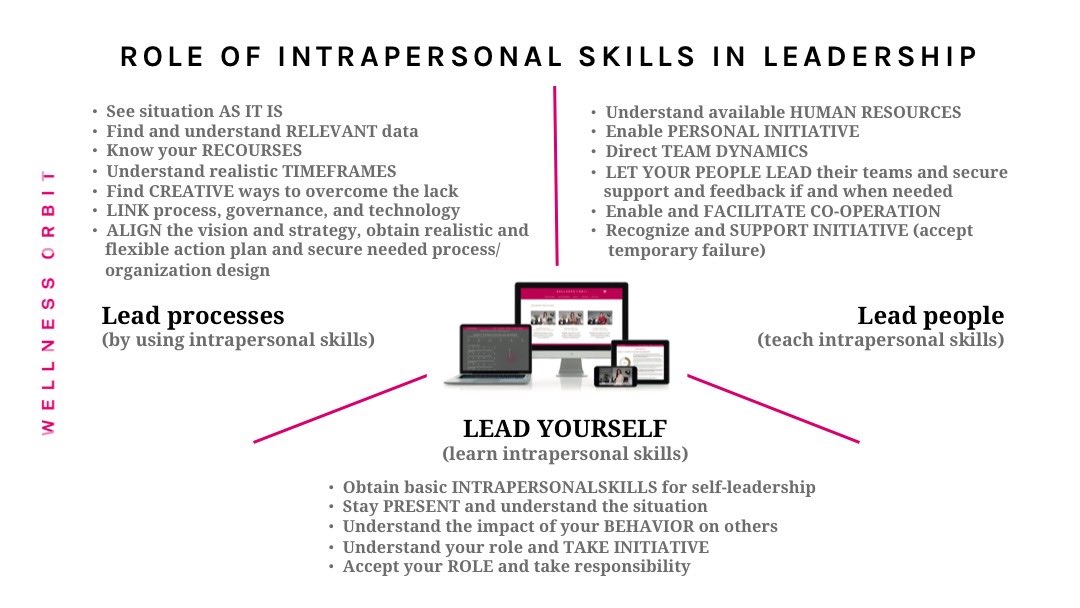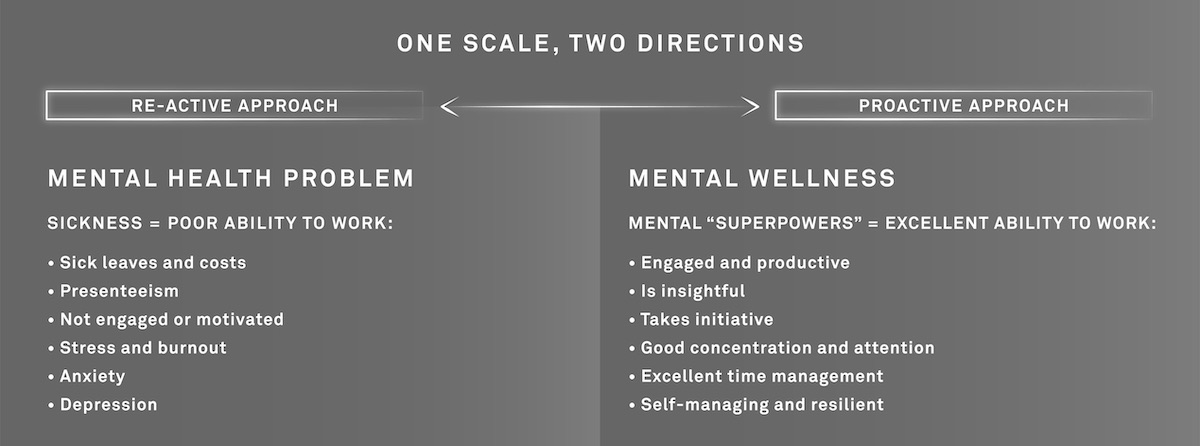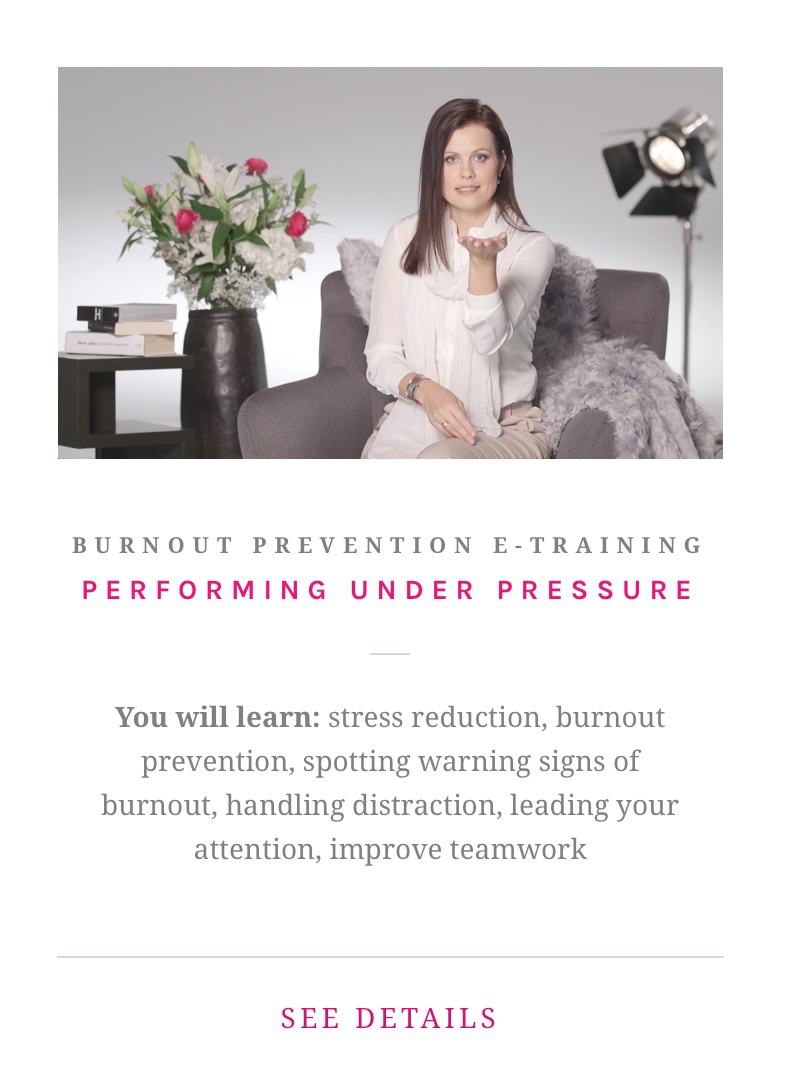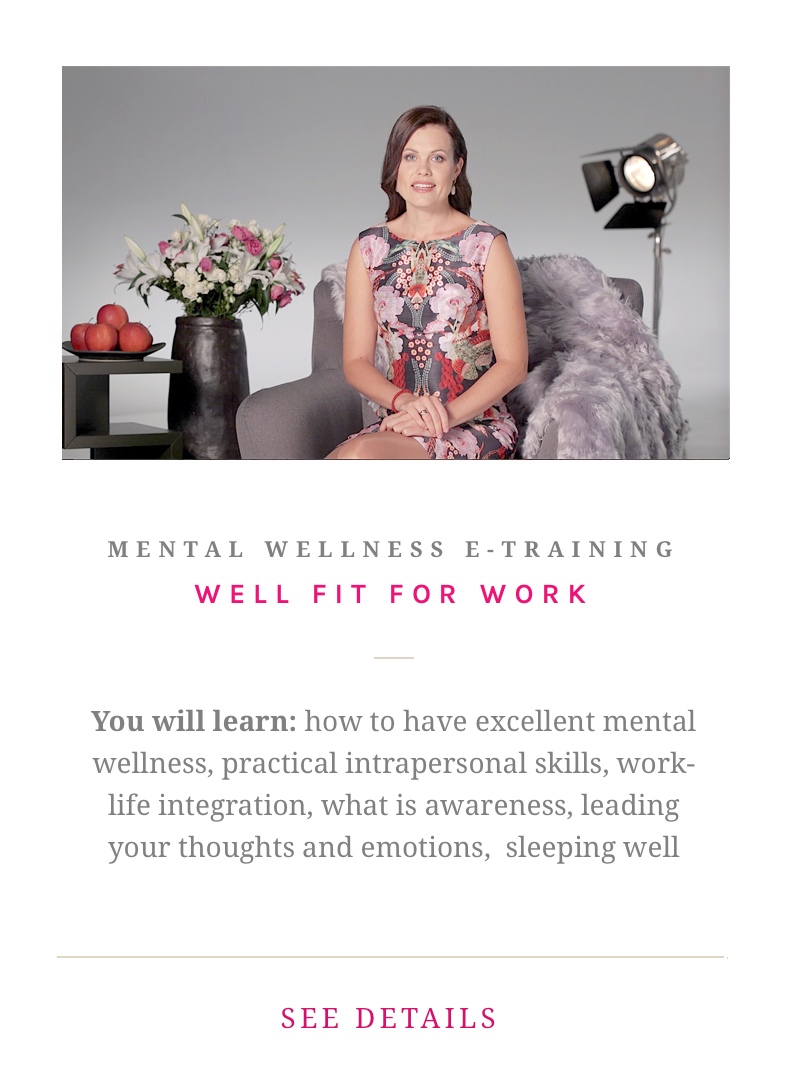Health is a spontaneous, dynamic and nurturing pulsation. The human body's native intelligence rejuvenates trillions of cells so that you can live your life. Without hurting somewhere in your body, you don't focus mentally on any part of your physical body.
Health is a multifaceted concept that encompasses not only the absence of physical ailments and overall wellbeing but equally sees the foundations of it in the state of one's mental and emotional well-being.
When considering health from a holistic mental wellness perspective, remaining inwardly calm in any situation plays a pivotal role in an individual's overall well-being.
The mental wellness aspect of health
Mental wellness refers to the state of flow and aware choices where one's mind and emotions are supporting a person's ability to cope with life's (including all work-related) challenges.
Without intense inner automatic reactivity, your mind is at ease and calm.
Mental wellness is about having a healthy state of mind, allowing you to cope with life's challenges and maintain good relationships. Good mental wellness means resilience.
100% of employees have mental wellness needs that exist on a continuum. It is only good mental health that is empowering.
Creating a workplace that fosters psychological safety and mental wellness is within reach for every organization.
A tranquil mind thrives where others get stressed, worried and anxious.
A calm-minded person enjoys aware leadership over the body by securing how well it sleeps, eats and rests. Such a person with a fit and sharp mind can lead all inner processes and is capable of doing it all while keeping calm.
A well-minded person is aware of how to build and maintain healthy relationships. Such a person is calmly focused on what needs to be done at any given moment and is therefore able to experience a sense of fulfillment.
Mental wellness and health are dynamic states that can fluctuate over time, influenced by various factors such as stress, life events, genetics and above all our lifestyle choices.
Our lifestyle is either learned subconsciously by reacting or based on our conscious/aware decisions and responses.
Conscious lifestyle is based on leading our inner domain.
When we are aware of our awareness and possess good intrapersonal skills, we become leaders of our own inner processes. Once we lead what happens within us, we can lead processes around us (see the graph below).

A mentally well person demonstrates resilience in the face of adversity. They possess intrapersonal skills to lead their mental and emotional processes.
They are present and aware, which allows them to understand and manage their imaginations, thoughts and emotions effectively. Such persons can access creativity and intuition and be flexible when meeting challenges.
Mentally fit and well-feeling persons remain the masters of their inner reactions, regardless of the situation. This not only helps in reducing stress and avoiding burnout and mental health issues but also in establishing influential interpersonal connections. Including good relationships within the family and workplace.
Well-minded people always understand the importance of keeping your physical body well and seek meaningful contributions.
It is excellent mental wellness that enables individuals to set and pursue meaningful goals, fostering a sense of purpose and satisfaction in life.
Performing meaningful work is above all about perceiving your role in the team and understanding the big picture.
Consequences of poor mental health
Conversely, poor mental health can bear profound consequences on a person's overall well-being.
Mental health conditions (like depression, anxiety or mood disorders) can disrupt people's flow state and reduce their daily functioning. This, in turn, impairs relationships (including customer relationships), reduces focus and makes personal and business growth difficult.
Mental health disorders can have both negative impacts on our health and sometimes a few surprising positive side effects. Such fascinating aspects can be some mental superpowers that allow us to see what others don't and jump into action where others are restricted. However, such inner powers are subject to ideal conditions and the positive behavior and work results can with any disturbances lead to withdrawal, inner negativity and destructive behaviors. What is missing here is stability and self-leadership.
Let us observe a few examples.
ADHD is one of those conditions permitting such compulsive traits that make you act impulsively at one moment and then get you extremely tired and inadequate a moment later.
Neurodivergent people may possess superpowers by connecting dots that others miss, but get stuck in securing thoroughly healthy life patterns and may act improperly in situations that matter.
In both cases, people may lack understanding of social norms or see them differently from others. However, when given the right tasks such people can excel, but when demanded common rules they often wither.
All mental health conditions demand support and treatment. What most people are unaware of is that all work-related mental health problems are fully preventable. This is what this site is all about.
When we have a fit mind, we all become capable of using our hidden mental superpowers (see the graph below).

Illness-centric approach to mental health vs proactive mental wellness application empowered to help everyone
We encourage your team to train their minds and give you intrapersonal tools for it.
We see that all workplaces win when people can remain healthy and well-fit for work, no matter what are the challenges. At least this is the ideal, in reality possessing practical intrapersonal skills is what makes a difference.
Intrapersonal education secures success, while lack of such inner self-leadership skills leads to inner turmoil causing first stress and anxiousness and later also severe mental health issues like depression, anxiety disorders, ADHD, etc.
When people worry, become anxious or stressed, mental health problems develop. The problems and ill health develop gradually, over several years (Note: too slow change is the key problem here as people lack intrapersonal education that allows self-monitoring) and have a heavy toll on people, workplaces and society as a whole.
The stigma associated with mental health issues often prevents individuals from seeking the help they require, exacerbating their suffering. Seeking help should be supported and favored by employers as most mental health conditions allow people to work, but drop engagement and productivity levels.
Remember, seeking support from trained therapists and mental health professionals (psychologist and psychiatrist), when needed is crucial in addressing and managing mental health challenges. However, we all can reduce our health risks by addressing stress.
Are you aware of how stress plays a key role in developing health (including most mental health) issues? Watch this video to improve your awareness about this key topic.
It is a scientifically indisputable fact that failure to combat stress effectively can lead to severe mental illnesses and physical health problems.
Besides mental health issues, those include increased blood pressure, susceptibility to heart disease and a decline in your immune system, which in turn leaves people more vulnerable to infections with different viruses and physical illnesses.
As 9 out of 10 are stressed at work and up to 3 out of 10 have anxiety or depression related problems, all leaders and HR professionals need to acknowledge they have a preventative role to play.
What this means is that totally fit-minded people in today's business world are extremely rare.
People with stress, burnout and mental health issues usually pretend to be fine. Mentally ill persons extremely rarely pretend to be ill. Remember this is why the decline of mental wellness is hard to spot.
Training your staff's minds proactively definitely can make a difference and give you a competitive advantage. And stress reduction is the starting point!
Are you aware of your stress level?
Promoting mental wellness
Promoting mental wellness involves adopting a proactive approach to self-leadership and self-care. Training your mind regularly and relaxing practices (like mindfulness and meditation) and physical exercise/movement matter. Also, maintaining a balanced diet and enjoying regular sleep and eating patterns can all contribute to a sounder mind.
We open up developing such patterns in the training "Well Fit For Work".
Most chronic health problems are the result of wrong lifestyle choices and worry. While accidents may happen suddenly, we presently know that hard hats and other measures help to reduce those. However, most workplaces miss a proactive mental wellness strategy.
In today's fast-paced and often stressful world, the significance of mental wellness cannot be overstated. Employers who invest in mental wellness not only save costs but can see up to tenfold ROI in their investments (click on the link to observe data that proves it).
Conclusion
Health is a concept involving both physical well-being and mental wellness.
Mental wellness represents a fundamental component of health that contributes to an individual's ability to lead a fulfilling and productive life.
Properly recognizing the paramount importance of mental well-being and taking steps to nurture it at work remains a vital aspect of achieving employee engagement and productivity.
The holistic health aspect, where both the body and mind thrive in harmony represents the key to good relations and thriving in life. To secure health, start training your mind like you already train your physical body.
Click the mental wellness training options below to receive a tailored offer or write to us – all queries are welcome.


.jpg)



